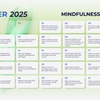Stress and Memory Loss: Understanding the Impact and Effective Solutions

Did you know that stress can have a profound impact on your memory? In fact, a recent study published in Jama Network Open shows a compelling connection between stress levels and cognitive function, finding that individuals with higher stress levels are nearly 40% more likely to experience difficulties with memory and clear thinking.
If you've ever experienced sudden memory loss or noticed a decline in your cognitive abilities during stressful periods, you're not alone. In this article, we will delve into the connection between stress and memory loss, explore how stress affects your memory, and provide practical tips to reduce the impact of stress on your cognitive function.
HOW DOES STRESS AFFECT YOUR MEMORY?
Stress triggers a complex cascade of physiological responses in the body, including the release of stress hormones such as cortisol. While these hormones serve a vital purpose in preparing us for "fight or flight" situations, chronic or prolonged stress can have detrimental effects on various bodily systems, including memory function.
1. Impaired Memory Formation
High levels of stress can hinder the formation of new memories, making it difficult to retain and recall information. This can manifest as forgetfulness or difficulty concentrating on tasks that require memory retention. Stress can affect the hippocampus, a brain region crucial for memory formation. The excess cortisol released during stress can disrupt the communication between neurons in the hippocampus, leading to impaired memory formation.
2. Disrupted Memory Retrieval
Stress-induced memory loss can also interfere with memory retrieval. The excess cortisol released during stress can affect the hippocampus, a brain region crucial for memory consolidation and recall. This disruption can result in difficulty accessing stored memories and recalling specific details. It can be frustrating when you're trying to remember something important but find your memory failing due to stress.
3. Reduced Attention and Focus
Stress can lead to increased distractibility and decreased attention span, making it challenging to concentrate on tasks. When our attention is divided or scattered due to stress, it becomes harder to encode information effectively into our memory. Have you ever found yourself reading a passage or listening to someone speak, only to realize that you can't remember what you just read or heard? Stress can contribute to this lack of focus and attention, impairing our ability to absorb and retain information.
CAN STRESS AND ANXIETY CAUSE MEMORY PROBLEMS?
Absolutely. Stress and anxiety go hand in hand, and both can significantly impact memory function. Anxiety disorders, characterized by persistent worry and fear, can lead to cognitive impairments, including memory problems. The constant state of alertness and hyperarousal associated with anxiety can impede concentration and disrupt the encoding and retrieval of memories. When stress and anxiety become chronic, they can have a long-lasting impact on memory, affecting both short-term and long-term recall.
HOW DO YOU FIX MEMORY LOSS FROM STRESS?
The good news is that there are effective strategies to mitigate the impact of stress on memory. By implementing certain techniques and adopting healthy habits, you can protect and enhance your cognitive function. Here are five tips to reduce the impact of stress on your memory:
1. Practice Stress Management Techniques
One of the most effective ways to combat stress-related memory loss is by incorporating stress management techniques into your daily routine. Engage in regular exercise, which has been shown to reduce stress levels and improve memory function. Physical activity stimulates the release of endorphins, the body's natural mood-enhancing chemicals, promoting a sense of well-being and relaxation. Additionally, consider incorporating relaxation techniques such as deep breathing exercises, meditation, or yoga into your daily routine. These practices can help calm your mind, reduce stress levels, and improve your ability
2. Maintain a Healthy Lifestyle
A healthy lifestyle plays a crucial role in supporting optimal memory function and reducing the impact of stress. Here are some key lifestyle factors to consider:
- Ensure you get adequate sleep each night, as sleep deprivation can exacerbate the negative effects of stress on memory. Aim for 7-9 hours of quality sleep to allow your brain to rest and consolidate memories effectively.
- Follow a balanced diet rich in nutrients that support brain health, including omega-3 fatty acids, antioxidants, and B vitamins. Include foods like fatty fish, berries, leafy greens, nuts, and whole grains in your diet. These nutrients help protect brain cells, reduce inflammation, and promote optimal cognitive function.
- Limit the consumption of stimulants like caffeine and alcohol, as they can disrupt sleep patterns and exacerbate stress. While caffeine may provide a temporary energy boost, excessive intake can increase anxiety levels and impact sleep quality.
Time management is a powerful tool for reducing stress and improving memory function. When you feel overwhelmed by tasks and deadlines, it can negatively affect your ability to focus and remember important information. Consider the following strategies:
- Prioritize tasks and create a structured schedule. Identify the most important and urgent tasks and allocate dedicated time slots to complete them. Breaking down larger tasks into smaller, manageable chunks can alleviate the pressure and enhance focus.
- Take regular breaks. Allow yourself short breaks during intense work periods to recharge and refocus. Use this time to engage in relaxation techniques or physical activity to reduce stress levels.
Human connection and social support are essential for managing stress and maintaining optimal cognitive function. Sharing your feelings and concerns with trusted friends, family members, or a therapist can provide emotional support and help alleviate stress. Engage in meaningful social interactions, join support groups, or consider therapy to develop effective coping strategies and gain perspective on your stressors.
5. Incorporate Innovative Stress-Relief Devices, such as TouchPoints
In addition to traditional stress management techniques, innovative stress-relief devices like TouchPoints can be valuable tools in reducing stress and enhancing memory function. TouchPoints utilize gentle vibrations to promote relaxation and reduce stress. Worn on your wrists, belt, socks, in pockets or held in your hands, they provide a portable and convenient tool for stress reduction.
TouchPoints have been scientifically designed to help regulate the body's stress response by stimulating the bilateral alternating stimulation-tactile (BLAST) effect. This gentle stimulation helps activate the body's relaxation response and counteract the negative effects of stress on memory and cognitive function.
By incorporating TouchPoints into your stress management routine, you can experience the benefits of reduced stress and improved memory. Whether used during stressful situations or as part of daily relaxation practice, TouchPoints can serve as a valuable tool to support your cognitive well-being.
Stress-related memory loss is a common issue faced by many individuals in today's fast-paced world. Understanding the impact of stress on memory function is the first step toward implementing effective strategies to reduce its negative effects. By practicing stress management techniques, maintaining a healthy lifestyle, managing time effectively, seeking social support, and incorporating innovative stress-relief devices like TouchPoints, you can protect and enhance your memory function.
Remember, managing stress is a lifelong journey, and it requires consistent effort and self-care. By prioritizing your well-being and implementing these strategies, you can minimize the impact of stress on your memory and maintain optimal cognitive function. Take control of your stress levels, and embrace a healthier, more focused, and sharper mind.
References:
- Lupien, S. J., Maheu, F., Tu, M., Fiocco, A., & Schramek, T. E.
-
Posted in
Stress




